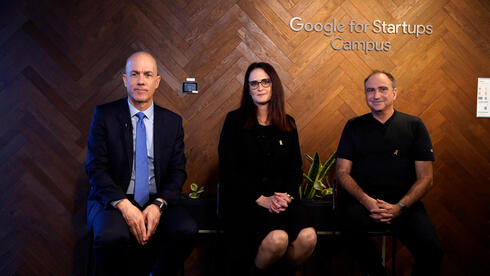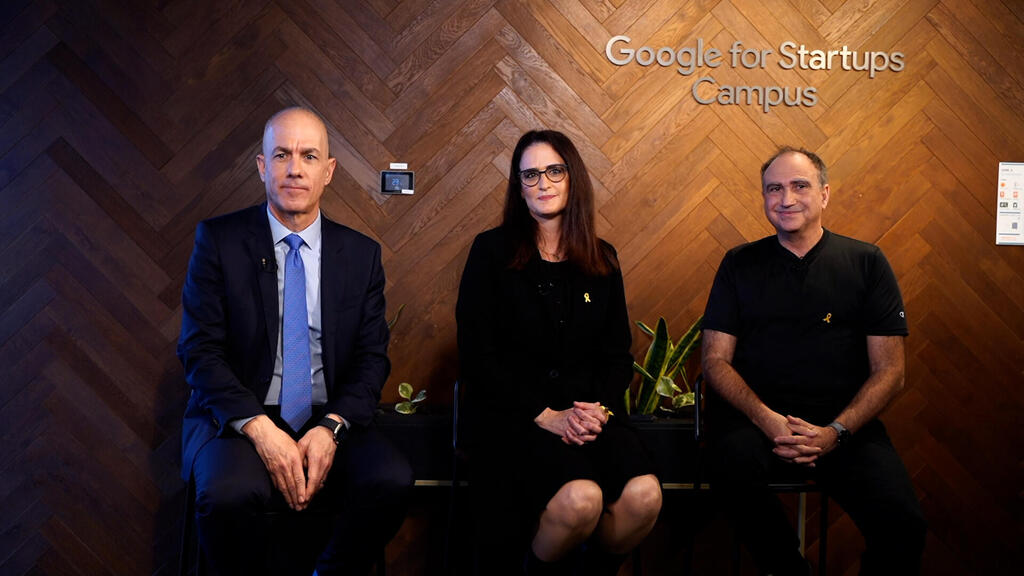
"AI makes it possible to solve problems that seemed impossible a few years ago"
Prof. Yossi Matias, VP at Google and Managing Director of Google's R&D center in Israel, spoke on a panel with Gali Shahar Efrat, General Manager of the Google and Reichmann Tech School at Reichmann University, and Amnon Merhav, Director General of the Ministry of Economy
"Never before in history has there been a situation where people have had the opportunity in a relatively short time to acquire an education and learn skills that will allow them to take part in something that has such a huge impact on the world," said Prof. Yossi Matias, VP at Google and Managing Director of Google's R&D center in Israel, during a panel as part of Google and Calcalist’s Startup Week.
"When we talk about AI, we often use expressions like 'transformation' or 'revolution,' and I think that's an understatement. Because, in fact, in every field, in every group that deals with finding solutions, what's been happening in the last year or two is rethinking how things are done with the new technology,” he said. "Instead of talking about a revolution, it should be understood that every professional field faces the question of how to integrate AI tools into its work. Artificial intelligence tools make it possible to solve problems that seemed impossible to solve a few years ago."
1 View gallery


"Keep on Delivering" panel (from left) Amnon Merhav, Gali Shahar Efrat,.Prof. Yossi Matias
(Photo: Sinai David )
Responding to the question of what the unique challenges are for training in changing fields such as AI, Gali Shahar Efrat, General Manager of the Google and Reichmann Tech School at Reichmann University, replied that this is not a specific field of training that can be defined, but rather a revolution in the making, and therefore change is constant. "One of the things we do in our training is equip our participants with tools and skills, but also with the ability to learn on their own on the go. Every challenge also comes with an opportunity, and when it comes to AI, it is a field for which the demand is very high. This is a great opportunity for many people to enter the field and learn the tools. This field dominates every area of our life and in the end, once you know AI, you have an advantage and a higher chance of being integrated into the job market than an employee who does not know. It's a bit like the electrical revolution. In the end, everyone connected to it and those who didn't were left sitting in the dark," she said.
According to Amnon Merhav, Director General of the Ministry of Economy, "The entire training model that has been introduced in the State of Israel for over 70 years is an old, archaic model that needs to undergo a fundamental change and adapt to the great technological tools that exist today." The Ministry of Economy, he said, is promoting a project that will enable compatibility of employees for jobs based on data and AI so that employers will get employees with the appropriate skills and train them according to their needs. "What employers are looking for today are the skills. They tell us that they know how to train their workforce but are interested in people who initially have the right skills for the particular profession. It is very similar to what happens in the army. Candidates for security service are tested, and the soldiers with the appropriate qualifications are transferred to the various units, and the units do the training. We want to copy this successful model to the world of employment," he said.
Matias called for "giving national priority to the training of quality personnel in the field of AI" by investing in scientific education in universities and high schools and fostering Israeli entrepreneurial culture and innovation. According to him, this is the way that will allow Israel to continue to be a global leader in the field. "We have a fundamental advantage that we have people who have the drive and attitude to do things and support each other. There is this spark that if we nurture it correctly, it will give us the same technological and entrepreneurial advantage that we have had all these years," he said.














